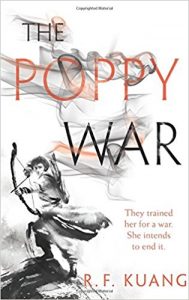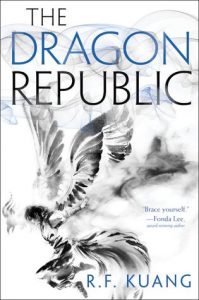The Poppy War by R.F. Kuang (Book Review)
 The Good: One of the most badass and brutal POV characters I have ever had the pleasure of reading, worldbuilding that rises up around the reader without you even realising, and a plot so tightly packed and paced that this veritable tome of a tale turns from page-turner to hair-tearer when you realise it’s all over but you STILL WANT MORE!
The Good: One of the most badass and brutal POV characters I have ever had the pleasure of reading, worldbuilding that rises up around the reader without you even realising, and a plot so tightly packed and paced that this veritable tome of a tale turns from page-turner to hair-tearer when you realise it’s all over but you STILL WANT MORE!
The Bad: I did feel that some of the agency stalled in part three. When the rest of the book was so tightly wound, I couldn’t help but notice that it lapsed here. Regardless, this is my nit-picking for a ‘the bad’, as this is a truly fantastic book.
The Ugly Truth: A coming of age epic that leads on to a magic school section of mayhem and mysticism, before spiralling into a grimdark no-holds-barred military fantasy that’d make Sun Tzu roll over in his grave to rewrite The Art of War, with Joe Abercrombie writing the foreword. The Poppy War delivers what most trilogies aspire to – in ONE BOOK.
Review: For full disclosure, I read this months ago but at the time was too busy to review it properly. And then, as happens in life, things got in the way and before I knew it, months passed and still no review. The fact that this has sat in my TBR pile AFTER the TBR pile (i.e the to-be-reviewed pile after breaking free of the mountain that is the to-be-read pile) is entirely my fault.
But, in a way, having put this aside for a few months has really helped me to realise how much this book got its claws into me.
The Poppy War, like a drug, has me hooked.
The Poppy War tells the story of Rin, a war orphan scraping at the bottom of society’s barrel. But when she passes the mandated tests of the Empire and earns her place in the most elite military school in Nikan, she learns that rising to the top doesn’t make the water in the barrel any less murky. Through teenage trials of friendship and falling out of love with your dreams, to the pains of growing up and what purpose life is supposed to hold, Rin learns life’s hardest lessons in the Sinegard military academy. Showing an aptitude for the equally mystical and mythical art of shamanism – something regarded as a bit of mumbo jumbo, or better yet, an excuse to get high – Rin learns the hard way that not all is as it seems. And just when she seems to have fought her own inner demons to a stalemate, an invading nation threatens all she knows.
Now, before I continue, I need to clarify something. I’m not a fan of ‘trigger warnings’ – though that’s probably because I deal with the sentiments/emotions that the content invokes in me in a different and probably not all that healthy way – but this book is full of them. It’s a veritable who’s who of violence, abuse, and pain in all its forms. Be warned.
It is also key to note that certain elements of The Poppy War are heavily influenced by the Rape of Nanjing/The Nanjing Massacre during the Second Sino-Japanese war.
For months now, in quiet moments when reflecting upon books, The Poppy War has crept into the back of my mind like an itch I can’t scratch – or the fix that I need. I’ve been lucky enough to read a lot of fantastic debuts in my time reviewing, and as a reader it’s as if I’ve struck gold in 2018 with all the recent releases of not-just-another-white-medieval-fantasy. The Poppy War is one of many new non-typical worlds brought to life by new voices, including Empire of Sand by Tasha Suri, The City of Brass by S.A. Chakraborty, and the Asian influences of RJ Barker’s Wounded Kingdom trilogy (aka the ‘Assassin’ books. #OhGirton). *
From the first page, the world rose up around me. Time and again I’ve used the ‘living, breathing worldbuilding’ line in reviews, but in The Poppy War, Kuang does more than this. When I first started reading The Poppy War I thought that maybe it’s because the Asian influence is so clear and distinct that I can imagine the world easier, or maybe it’s because I was so hyped for this book I had already built the world for it inside my head. In hindsight (several months’ worth, but still a beautiful thing) it’s because Kuang’s worldbuilding and scene setting was done so cleverly that I didn’t notice the individual blocks until the whole was built and I was already sitting down with my feet up reading the book in the comfort of the newly constructed house.
 At which point ‘the first page’ has been and gone, and so has the first few chapters, and before I knew it, I was through the first part, with only two left to go, and I didn’t want the story to end. The plot is tightly packed, especially in the first third, which takes Rin from her ‘coming of age’ to ‘magic school’. The pace is thick and fast and doesn’t let up throughout. The only time I had an issue with the story was in part three, as I felt that some of the agency was lost at the start of that section. However, by the end Rin was well and truly back in control – or not, as it were.
At which point ‘the first page’ has been and gone, and so has the first few chapters, and before I knew it, I was through the first part, with only two left to go, and I didn’t want the story to end. The plot is tightly packed, especially in the first third, which takes Rin from her ‘coming of age’ to ‘magic school’. The pace is thick and fast and doesn’t let up throughout. The only time I had an issue with the story was in part three, as I felt that some of the agency was lost at the start of that section. However, by the end Rin was well and truly back in control – or not, as it were.
With every book I read I try and put my finger on the ONE thing that stands out the most for me, and with The Poppy War I had a hard time deciding what that was. Until now.
It was Rin.
Rin is one of the most compelling, complex and comprehensive characters I have ever read. At first she’s the underdog character, the type of ‘chosen one who was never meant to be’. Except, as the story progresses, her fierce spark of determination becomes a flicker of fire, then a flame, and by the end it’s a raging inferno. She is a heroine reminiscent of a Greek tragedy, hearty but equally heart-breaking, whose hubris and failures are linked not just to her faults but her strengths too. She is deeply flawed. Deeply. But at the same time she makes decisions based on logical comprehension that the normal person either wouldn’t see, or even bring themselves to face it and weight it as a choice. She does what others cannot, because they will not.
There is a particular moment in part one, when Rin is faced with a dilemma and a decision, which I won’t cover due to spoilers. Firstly (and you will know the moment when you get to it), I have never heard of a book present this type of dilemma to a character, or indeed the reader, and secondly, Rin’s decision blew me out of the water and left me ‘whu whu whu’ing like a fish trying to breathe. It will probably go down as one of my most memorable moments in fantasy of all time.
Which is a fitting farewell to a book that I will no doubt continue to think of. ‘One of the most memorable’ has more of a ring than ‘the damn book haunts me when I can’t sleep at night,’ but both are true. I like to think that the best books make you feel or think something, and by this mark, The Poppy War is one of the best books I have ever read.
*Side note: I’d like to take a brief moment here to reflect on that sentiment: representation in fantasy, both that of the story and the teller.
The world is a very big place. It’s also very old.
There are far flung corners of the map that I, and many others (maybe even you, dear reader?), have yet to read stories ‘influenced’ or ‘inspired’ by these places, the history of the locations found there, or the people that have lived there. And, because we are talking about fantasy here, it’s not just about what/where is on the horizon, it’s about what is over the horizon, in places you cannot see except for in your mind.
So, if anyone is short-sighted enough to not see the beauty beyond the four walls of the box you’ve built around your own expectations, please feel free to expand your horizons, and join in exploring a brave new world, and whatever lies ahead of us.
The world is a very big place. It’s also very young.
And I for one look forward to seeing where it goes next.

[…] https://fantasy-hive.co.uk/2018/11/the-poppy-war-by-r-f-kuang-book-review/ […]